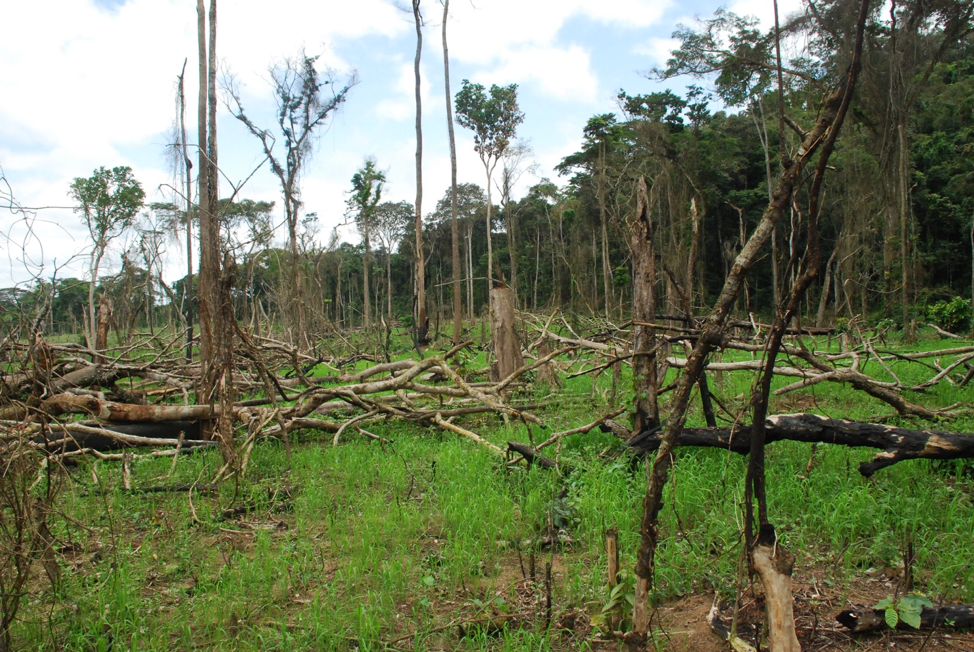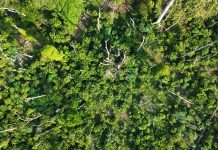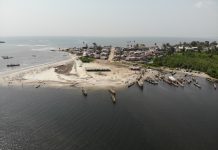Banner Image: A cleared forestland in Lofa County. The DayLight/James Harding Giahyue
By Varney Kamara
MONROVIA -Dutch financial institution Rabobank received USD$375 million from investing in oil palm projects in Liberia, which are marred by deforestation and human rights violations, according to a new report by Global Witness.
Rabobank, a Dutch financial institution, generated dividends from its investment into Sinar Mas Group, an agribusiness and Food Company and chief investor into Golden Agri Resources (GAR), Golden Veroleum’s largest shareholder.
“The Government of Liberia must redirect harmful finance and promote community-based agriculture and forest management so that Liberians benefit directly from their natural resources,” said Danielle van Oijen, Friends of the Earth – Netherlands, who worked on the report. “The government must get hold of such money as a way of preventing deforestation across industrial plantations.”
The report found that as of July 2018, Rabobank had credited Sinar Mas US$150 million, according to an update provided last December by BankTrack, an international NGO that traces banks’ financing deals. The credited amount was given to GVL through Verdant Fund LP, its parent organization.
Rabobank and other banks from the European Union, the United Kingdom, the United States and China netted $$1.74 billion in interest, dividends, and fees from financing agribusinesses groups that have destroyed tropical rain forests in Brazil, Southeast Asia and Africa since the Paris Climate Agreement. Its finances were invested into soy, beef, palm oil and pulp and paper, according to Global Witness. The credits have involved banks and asset managers whose firms have been accused of causing global climate emergency and placing a shattering cost for rural communities who depend on forests for survival.
An earlier report by Friend of the Earth – Netherlands found that GAR, in 2012 received US$90.8M from Rabobank and $152.21M the next year. The latter was given mainly for the operations of GAR. In 2017 and 2018, ABN AMRO provided a total of US$300.8M to GAR and its subsidiaries.
GAR and other multinational companies use a chain of financial structures to fund their subsidiaries with money they receive from Dutch banks while hiding their connections and avoiding direct liabilities. Over the last five years, GAR, Wilmar and Société Financière des caoutchoucs (SOCFIN) received different loan portfolios from Rabobank. The report comes as palm oil, the most frequently used vegetable oil in the world become a highly controversial commodity. In Indonesia, the headquartered country of GAR, Golden Veroleum’s biggest investor, rain forest there was destroyed and local farmers were chased off their land, according to farmland.org, a website, which tracks purchase and lease of farmland by companies globally.
“Enforcement is lacking and companies do not see the consequences of their harmful operations,” van Oijen said. “We call upon all financiers to immediately stop financing companies engaged in deforestation, pollution and human rights violations, and provide compensation and remedy to the victims and environment.”
Rabobank denied it is financing GVL activities in Liberia. “Loans are generally connected to specific activities and the subsidiary activities in Liberia are not financed by Rabobank,” Johan Verburg, senior policy advisor on risk, sustainability and climate, told The DayLight.
GVL has been frequently linked with deforestation and human rights abuses since it signed a 65-year concession agreement with the government of Liberia in 2010. The company secured 220,000 hectares for its oil palm production across communities in Sinoe, Grand Kru, Maryland counties. But its operations have been tinted with deforestation, land-grab, and human rights violations.
On May 26, 2015, hundreds of Butaw youths demanding jobs and community development were beaten by heavily armed riot police on orders of the company, incarcerating several youths for over a year without trial. One person died from the violence, and several thousand worths of properties were damaged.
GVL has also been accused multiple times of carrying out numerous human rights abuses against workers, including community people. The Roundtable on Sustainable Palm Oil (RSPO), a global oil palm regulatory body, found the company guilty of committing human rights abuses, including forceful entry into traditional shrines. It found the company responsible for illegally encroaching on community lands outside of its concession area. GAR recently upheld the RSPO’s ruling, saying on its website, “There was no attempt to hide or deny the clearance of community land,” vowing GVL would not clear any additional land until it develops a sustainability plan for review by the HCSA.
Last yea0r, the High Carbon Stock Approach (HCSA) report established GVL cut down trees across a thousand hectares of forests, habitat for endangered species and important wetlands. The report found GVL violated the land and cultural rights of local communities, including the right to free, prior, and informed consent.
Golden Veroleum said it would respond to the report. “GVL is working with RSPO and HCSA under their respective complaints systems and that we have previously responded to the allegations,” said Alphonso Kofi, its communication officer.





Facebook Comments